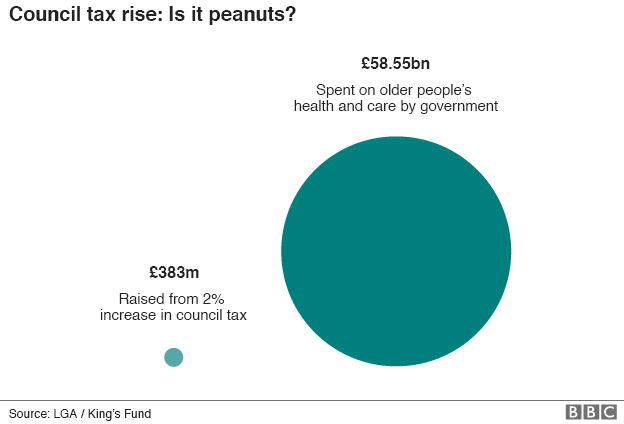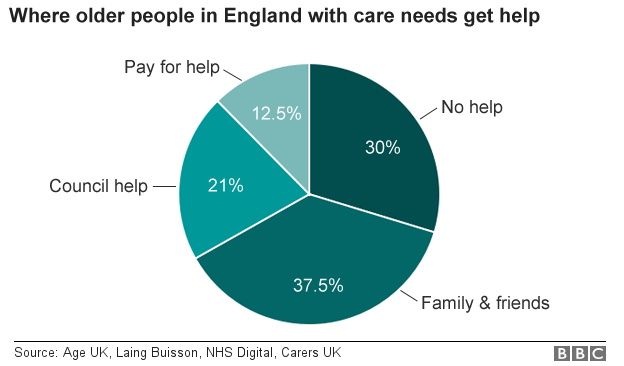Why council tax hike for care raises peanuts
- Published

Over the years there have been some pretty radical suggestions to solve the care crisis. A cap on care costs, a "death tax" and even a full merger of the free-at-the-point-of-need NHS and means-tested social care systems have all been mooted.
But it appears the government in England is now looking at something much less reforming - giving town halls permission to increase council tax by more than they are currently allowed to.
If that is the case - and we will have to wait until Thursday for the announcement - the money raised (barring an astronomical hike in bills) will be peanuts, relatively speaking.
That is because the challenge presented by the ageing population is not just about what happens in one corner of the sector - council-funded care home places and home help - it is about the whole health and care system.
That incorporates the growing numbers who pay for care themselves and, of course, the NHS.
Find out the cost of care in your area
Walk into any A&E unit or take a stroll around the wards of hospitals up and down the country and one overwhelming image will strike you - the sheer number of old people occupying beds, trolleys and waiting rooms.
At any one point it is estimated that the over 65s account for nearly two-thirds of hospital patients. During winter it is even worse - and that is why we have heard so much about the issue in recent weeks.
But the evidence has been mounting for a lot longer than that. For months, if not years, academics, council leaders and those working for the NHS have been singing from the same hymn sheet. They want a major reform in the way older people are supported.
Without that, they predict, the country will continue to struggle to keep older people out of hospital and to discharge them when they are medically-fit to leave.
And this is just going to get harder in the future - the number of over 65s is predicted to rise by 40% over the next 20 years.


But with the government seemingly ready to step in, the lukewarm response of local government and charities representing older people has been telling.
As soon as the suggestion hit the headlines on Monday, Izzi Seccombe, from the Local Government Association, took to the airwaves to dismiss any notion it provided a real solution.
Why? It simply wasn't enough to "plug the gap", she said, and what was more it tended to raise the least money in the poorest areas which are most in need of extra funding.
Councils have already been given permission to increase council tax by 2% a year throughout this parliament, and while not every council has taken up the option, most have.
This year the precept - as it is called - raised an extra £383m. That may sound a lot. But paying for the introduction of the national living wage has cost councils more.
And that figure is just a fraction of the "whole" health and care market aimed at older people.
If you factor in funding for the NHS that is spent on them and the money used for attendance allowance, a benefit which is given to people with care needs, the total spend is estimated to be something approaching £60bn a year.
But despite these sums 1.2m older people with care needs get no help, another 1.5m rely on family and friends and an estimated 500,000 pay for their own care.
And that is before you even consider that any money coming into the system has to be shared with services providing support to disabled people.
Given all that, it is easy to understand why people are not jumping up and down with excitement.












